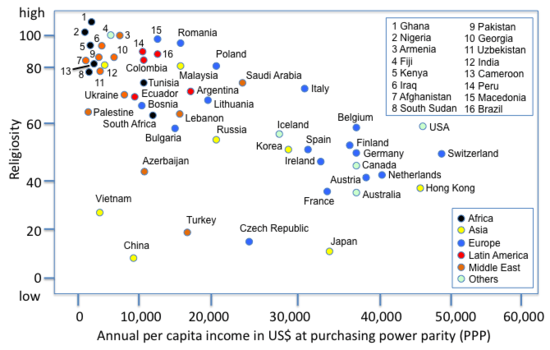Economics of religion

The average annual income of countries correlates negatively with national levels of religiosity.[1]
The economics of religion applies socio- economic theory and methods to explain the religious behaviour patterns of individuals, groups or cultures and the social consequences of such behavior. An example of the first is Adam Smith's analysis of the effect of competition and government regulation (or support) for religious denominations on the quantity and quality of religious services.[2] An example of the second is Max Weber's thesis that the Protestant ethic promoted the rise of capitalism.[3]
Religious (or theological) economics is a related subject sometimes overlapping or conflated with the economics of religion. It uses religious principles to evaluate economic perspectives or vice versa.[4]
See also
- Buddhist economics
- Cultural economics
- Economic imperialism (economics)
- Institutional economics
- New institutional economics
- Religion and business
- Sociology of religion
- Wealth and religion
- Female labor force in the Muslim world
- Religiosity and intelligence
Books:
References
- ↑ WIN-Gallup. "Global Index of religion and atheism." (PDF). Retrieved 21 October 2012.
- ↑ • Adam Smith, 1776 1904. Wealth of Nations, Book V, Chapter I.
• Gary M. Anderson, 1988. "Mr. Smith and the Preachers: The Economics of Religion in the Wealth of Nations," Journal of Political Economy, 96(5), p p. 1066-1088. Reprinted in Paul Oslington, ed., 2003. Economics and Religion, Elgar, v. 1, pp. 336-358. - ↑ • Max Weber, [1904] 1920. The Protestant Ethic and the Spirit of Capitalism.
• Kurt Samuelsson, [1957] 1964. Religion and Economic Action: A Critique of Max Weber. 1-page chapter-preview links.
• Jacques Delacroix and François Nielsen, 2001. "The Beloved Myth: Protestantism and the Rise of Industrial Capitalism in Nineteenth-Century Europe," Social Forces, 80(2), pp. 509-553 (press +). - ↑ For example, the Journal of Markets & Morality of the Acton Institute for the Study of Religion and Liberty and Faith & Economics of the Association of Christian Economists.
• Paul Oslington, ed., 2003. Economics and Religion, Elgar, v. 2, part II, Economics of Religion, scrollable table of contents, 10 of 41 papers, 1939-2002.
• Patrick J. Welch and J.J. Mueller, 2001. "The Relationship of Religion to Economics," Review of Social Economy, 59(2). pp. 185-202. Abstract.
• Paul Oslington, 2000. "A Theological Economics," International Journal of Social Economics, 27(1), pp.\ 32-44.
• Paul Oslington, ed., 2003. Economics and Religion, v. 1, Historical Relationships, table of contents, pp. v-vi with links via upper right-arrow to Introduction and first 11 of 17 papers, 1939-2002.
• Paul Oslington, ed., 2003. Economics and Religion, v. 2, part I, Religious Economics and its Critics, scrollable table of contents, 14 papers, 1939-2002.
• A.M.C. Waterman, 2002. "Economics as Theology: Adam Smith's Wealth of Nations," Southern Economic Journal, 68(4), p p. 907-921. Reprinted in Paul Oslington, ed., 2003. Economics and Religion, v. 1, pp. 321-336.
• Thomas Nixon Carver, 1908. "The Economic Basis of the Problem of Evil," Harvard Theological Review, 1(1), pp. 97-111.
• _____, 1912. The Religion Worth Having. Chapter links.
• Mahmoud A. El-Gamal, 2006. Islamic Finance: Law, Economics, and Practice. Cambridge. Description and chapter titles.
External links
- Does God Want You To Be Rich?
- Economics of Religion Gateway: "What is the economic study of religion?" from the Association for the Study of Religion, Economics, and Culture.
- European Network on the Economics of Religion
- "Economists Are Getting Religion," Business Week
- "The economics of religion"
This article is issued from Wikipedia - version of the 9/27/2016. The text is available under the Creative Commons Attribution/Share Alike but additional terms may apply for the media files.